Cheap Wisdom Teeth Removal in Houston
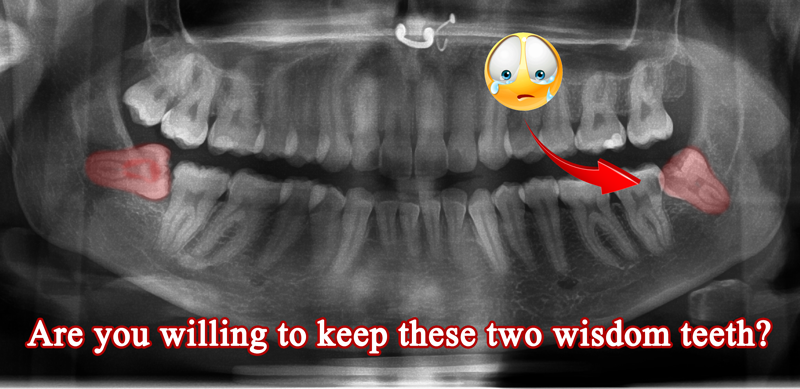
Are you dealing with the discomfort and pain caused by wisdom teeth?
If so, it's time to explore affordable wisdom teeth removal options in Houston, TX. In this blog, we will discuss the necessity of wisdom teeth removal and help you understand why extraction is often recommended. We will share actual cases from our office so you will understand the importance of removing wisdom teeth when needed. We'll also dive into the factors that influence the cost of wisdom teeth removal, including different types of extractions and dental insurance coverage. Additionally, we'll walk you through the procedures involved in wisdom teeth removal, potential complications to be aware of, and what to expect during recovery.
Say goodbye to your wisdom teeth troubles and save money today!
For a limited time, have all 4 wisdom teeth removed with IV sedation for $1400 only. restrictions apply

When Is Wisdom Teeth Removal Necessary?
Wisdom teeth also known as the third molars are usually the last adult teeth to come in. They are usually positioned at the back of the mouth. These teeth normally come out between the ages of 17 and 20 for every person.
Most people don't really worry about their wisdom teeth unless they actually start to bother them. This will happen either because the wisdom tooth does not have enough space to come in, or the wisdom tooth area is infected.
on the other hand, some wisdom teeth may not need to be removed when they are healthy and have enough space to grow naturally.
Seeking professional dental advice before making a decision is crucial. It's important to save money on wisdom teeth removal without sacrificing quality or safety.
If the third molar is coming in at a bad angle it can push on your other teeth and cause damage. To read my article about damages from wisdom teeth, please click here
Whenever the wisdom teeth remain unmerged or trapped under the gums they are considered to be an impacted wisdom teeth.
If you have a panoramic X-ray, you might email it to us and we will send you a price estimate [email protected]
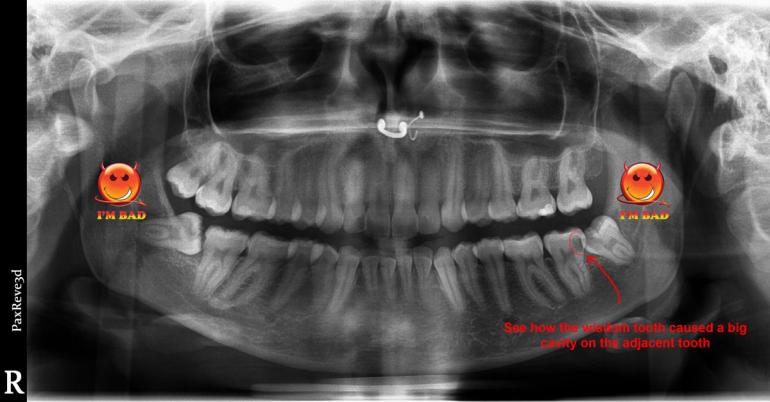
Understanding the Need for Extraction
Wisdom teeth removal is often necessary in dentistry due to:
- limited space in the mouth, leading to overcrowding and potential misalignment.
- If they are coming at a bad angle, this will cause tooth impaction and can push on your other teeth and cause damage to adjacent teeth case #1 REF
- Impacted wisdom teeth can cause jaw pain, toothache, inflammation, infection, cyst formation and damage to surrounding bone with a prevalence of 12% REF .
Extraction of wisdom teeth is a preventive measure to avoid future complications such as decay and gum disease (REF). Early removal minimizes the risk of complications and eases the recovery process. Consultation with a dental professional is crucial to determine the need for extraction based on individual circumstances.

Types Of Impacted Teeth:
The 3D X-ray is the best way to identify impacted wisdom teeth that are trapped beneath the gum line. Based on their location, they can be classified as:
- Soft Tissue Impaction: This occurs when the crown of the tooth has penetrated the bone but the gums are still covering the tooth partially or completely. The area would be very difficult to keep clean and will become a breeding ground for bacteria. This would be will be detrimental to your oral health. Dental care would be needed as soon as possible. You may also develop a cyst that can also hurt the root of your other teeth.
- Partial Bony Impaction: In this case, the tooth has only partially erupted but a portion of the crown remains underneath the gum surrounding the jawbone.
- Complete Bony Impaction: Complete bony Impaction occurs when the jaw bone entirely
- surrounds the tooth and requires more complex surgical procedures to remove "case #2" .
Early identification is crucial for planning the timely removal of impacted wisdom teeth.
call us today at 281-249-9999 for a FREE 3D X-ray to evaluate the necessity to remove your wisdom teeth
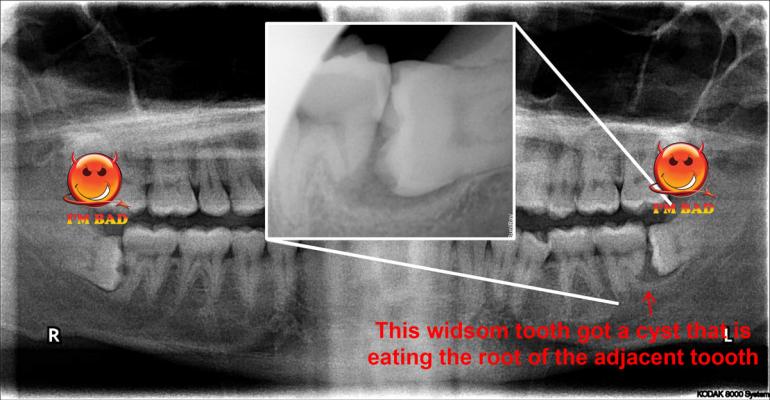
The American Dental Association deems wisdom tooth extraction necessary if you experience any of the following conditions:
- Pain
- Repeated infection of soft tissue behind the lower last tooth fluid-filled sacs (cysts)
- Tumors
- Damage to nearby teeth
- Gum disease
- Extensive tooth decay
What are the Payment Options Available for Wisdom Teeth Removal?
Payment options for wisdom teeth removal vary by dental clinics. Cash, credit cards, and debit cards are commonly accepted. Some clinics may also accept dental insurance. In addition, financing options or installment plans may be available to make the procedure more affordable. It's important to discuss payment options and any financial concerns with the dental clinic before scheduling the procedure.
How Much Does Wisdom Teeth Removal Cost?
To get an idea of the average cost for all four of your wisdom teeth removed under IV Sedation, we called multiple dental locations in the Houston metro area and came up with this chart.
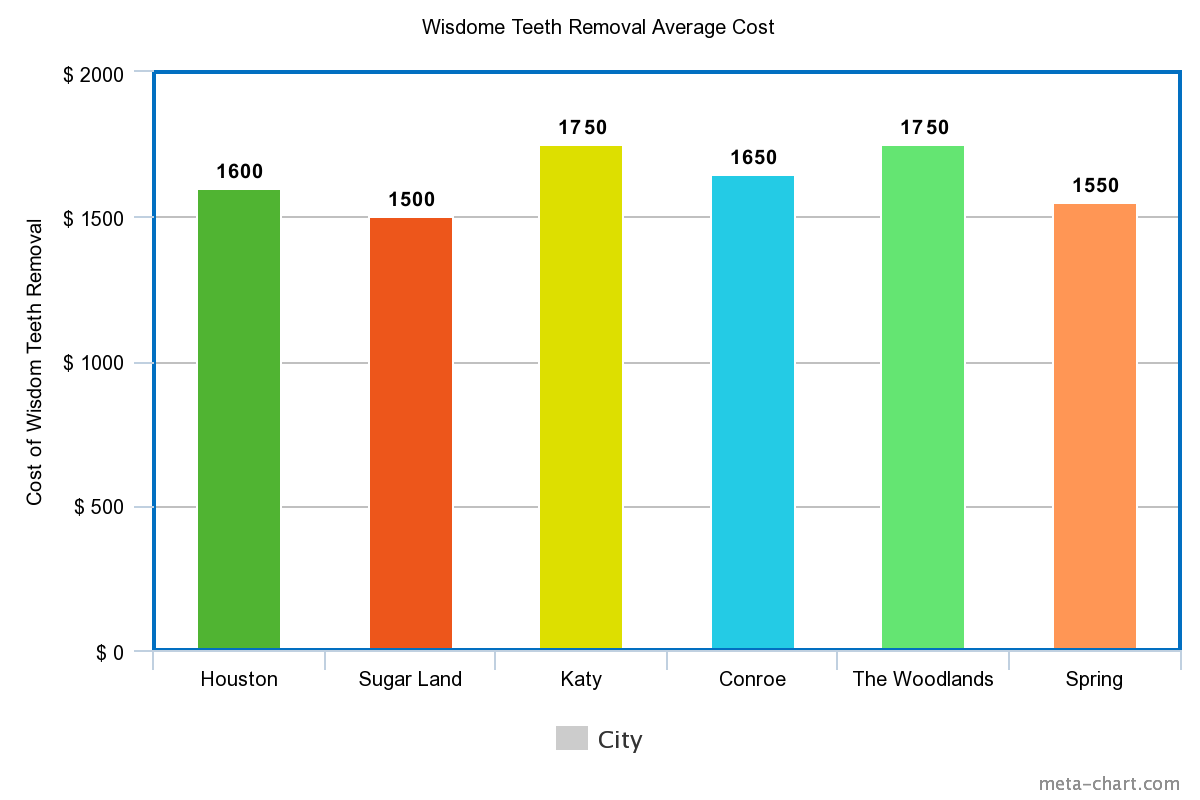
If you have Insurance, we will bill your insurance companies and you will pay your copay $200-$500 based on the type of insurance you have.
The cost of wisdom teeth removal starts at $999.00 for ALL 4 wisdom teeth with NORMAL sedation. It is an extra $400 for IV sedation if needed. "Our Oral Surgeon will decide to do IV sedation or not based on your case."
Cheap Wisdom Teeth Removal Packages in Houston
Wisdom teeth removal packages in Houston offer comprehensive services at affordable prices. These packages typically include pre-operative consultations, anesthesia, surgery, and post-operative care. The cost of the package may vary depending on the complexity of the extraction and any additional services required.
iSmile specialists is proud to offer a package for cheap wisdom teeth removal in Houston. For most patients, it would be $1400. This price might go up to $2000 in extreme cases .
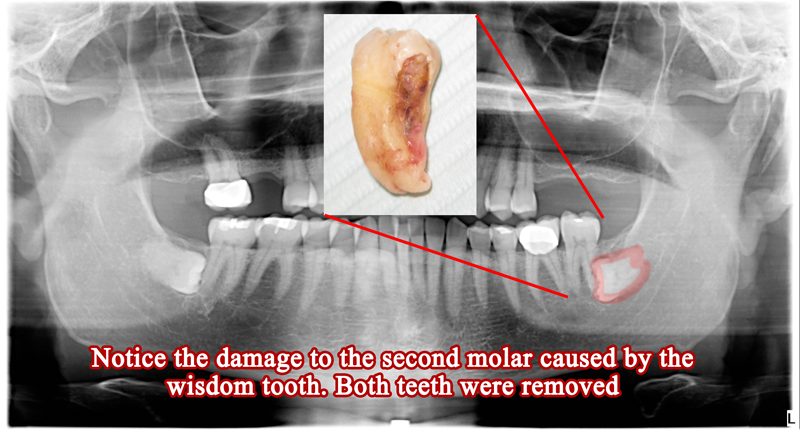
Factors Influencing Wisdom Teeth Removal Cost in Houston
Factors that can influence the cost of dental surgery to remove your wisdom teeth in Houston include :
- The complexity of the extraction,
- The number of wisdom teeth being removed,
- The proximity of the wisdom tooth to the lower jaw nerve,
- The necessity to use IV sedation or not, and
- The location of the dental clinic, insurance coverage, and additional services or procedures required such as bone graft.
The more difficult the extraction or the higher the number of teeth being removed, the higher the cost may be. Additionally, the location of the clinic, insurance coverage, and any additional procedures can impact the overall cost. Finally, highly experienced and reputable oral surgeons may charge higher fees for their services.
we used to believe – like others – that keeping our wisdom teeth is better than removing them. Also, some religious people believe that GOD created them for a reason, and we should not take them out.
However, we have been documenting - after seeing 1000s of patients over the years - the damages and problems that these wisdom teeth can cause. Thus, we are firm believers that it is not a wisdom practice to keep wisdom teeth.
Here are some patients who REFUSED to remove their wisdom teeth and then came back with problems.
How Dental Insurance Affects the Extraction Cost
Dental insurance coverage for wisdom teeth removal varies. Some insurance plans may cover the full cost of extraction, while others may only cover a portion. It's important to understand your insurance policy, deductible, and any limitations or exclusions. For example, Delta Dental Plus health care plan covers 80% for in-network simple and surgical extractions.
From our experience at iSmile Specialists, your out-of-pocket expense with most PPO insurance plans is usually between $200 to $500 for all wisdom teeth with IV sedation.
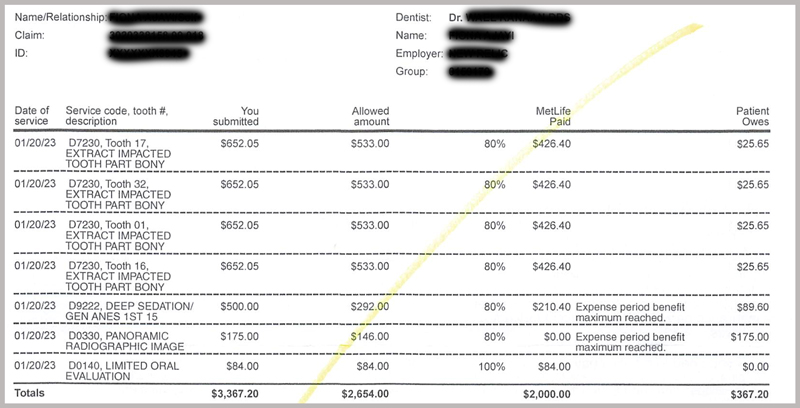
Coverage for Different Types of Tooth Extractions
Dental insurance coverage may vary for different types of wisdom tooth extractions. This will happen if some of the wisdom teeth are classified as full bony while the others are classified as partial boney. we - at iSmile Specialists - like other oral surgeon offices- will submit an EOB " Explanation of Benefits" to your dental insurance to get an accurate estimate of your insurance coverage and how they will classify your wisdom teeth case.
Seeking Affordable Care without Dental Insurance
Again, negotiating prices with oral surgeons and getting comprehensive packages is the best way to have all your wisdom teeth removed at a reasonable price. Our package of $1400 will get you covered with IV sedation and will fit most patients.
Also, You may qualify for credit-based financing such as care credit. An application will need to be filled out with care credit to determine eligibility and help break up the cost of this dental procedure. If you have a Flexible Spending Account (FSA) or Health Savings Account (HSA), you can use pre-tax dollars to pay for the procedure. Discussing payment options with your dentist will help you find the most suitable option for your budget.
Call us today to schedule your FREE X-ray and consult.
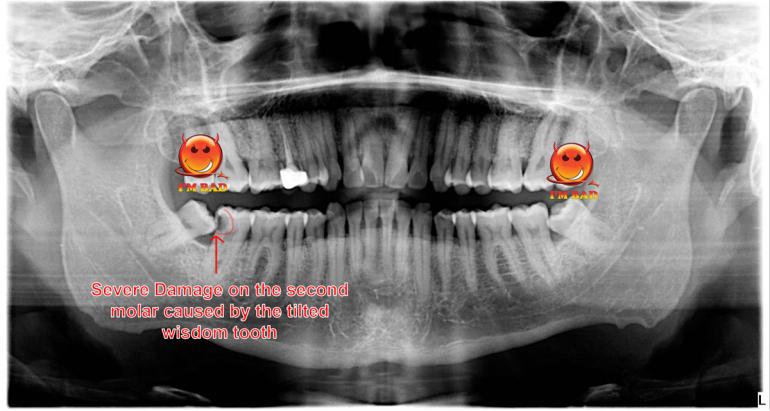
Procedures Involved in Wisdom Teeth Removal by the Specialist Dentist
During the wisdom teeth removal procedure, several steps are involved.
- An initial exam and x-ray are performed to determine the position and condition of the wisdom teeth.
- Following this, we will administer either local anesthesia to numb the area or general anesthesia to put the patient to sleep during the extraction.
- The dentist carefully removes the wisdom teeth, making incisions if necessary, and may need to break them into smaller pieces for easier extraction.
- Afterward, dissolvable stitches are used to close the incisions.
- Finally, the patient is provided with aftercare instructions for a smooth recovery process.
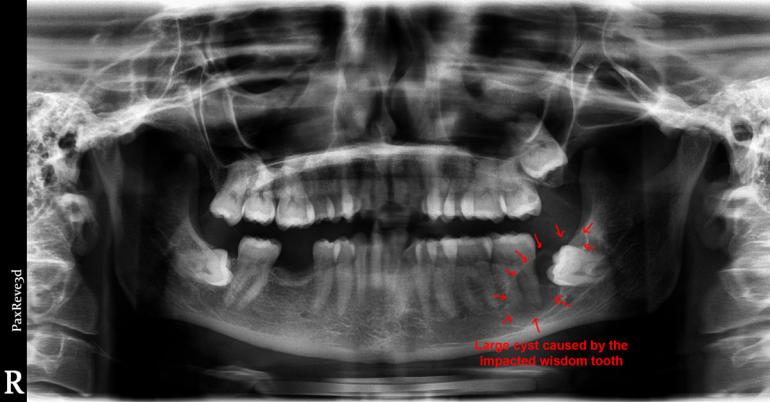
Types of Tooth Extractions and Their Costs
When it comes to tooth extractions, there are two different types that can affect the overall cost.
- Simple tooth extraction is a common and less complex procedure, resulting in a lower cost and shorter recovery time.
- On the other hand, surgical tooth extraction involves more complexity and potential complications, making it a pricier option.
1. The Process of Simple Extraction
The simple extraction is a common procedure for removing fully erupted wisdom teeth. The dentist will numb the area with local anesthesia before gently loosening and removing the tooth. This procedure is usually quick and straightforward, with minimal discomfort during and after. Recovery from simple extraction typically takes a few days, with proper care and pain management. Additionally, simple extraction is often more affordable compared to surgical extraction for impacted wisdom teeth.
Our specialist Dr. Samo can remove some wisdom teeth in 2 minutes or less! See the top Video. He uses special modern tools to remove wisdom teeth. These state-of-the-art instruments minimize post-extraction swelling and make healing faster with fewer complications.
The cash cost of simple extraction without insurance is $800 to $1000 without IV sedation. This could be done by Dr. Kanaan or Dr. Samo.
2.The Process of Surgical Extraction with sedation
These cases will require a small incision to be made in the gum to access the tooth. The tooth also might need to be divided into sections for easier removal. Sutures are then used to close the incision and promote healing.
These cases will take longer time between 40 and 60 minutes and are usually done by our surgeon with IV sedation.
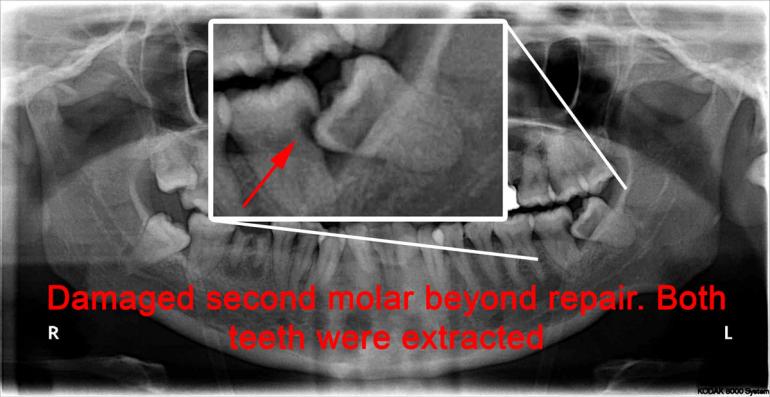
How Long Does It Take to Remove Wisdom Teeth?
Usually, the time it takes to remove a wisdom tooth is between 20 to 40 minutes.
The time varies based on the complexity of the extraction.
Our specialist Dr. Samo can remove wisdom teeth in 2 minutes or less!
He uses special modernized tools that are not used by other dentists.
These state-of-the-art instruments minimize post-extraction swelling and make healing faster with fewer complications.
What Does It Feel Like to Get Your Wisdom Teeth Removed?
Wisdom tooth removal can be completely painless and effortless. But, it can also be a little challenging and this all depends on a variety of factors.
The level of complexity of each patient varies. Wisdom teeth removal can be done with a variety of sedation options. Listed below are the different anesthesia used for wisdom teeth removal.
- General Anesthesia: you will be completely unaware of the whole procedure and will be done in the Hospital for extremely complex cases or special needs patients. You will require someone to drive you home because you will still be drowsy even after coming out of anesthesia.
- IV sedation: numbs your mouth and also drugs pumped into your vein in your arm to make you drowsy. This could be done in our office and most likely you will fall asleep throughout the whole procedure.
- Local anesthesia: can also be used when the doctor removes the tooth. The extraction site will be numbed and you will still be awake but you will feel no pain. Most dentists use this method especially if there are no complications that make the extraction more difficult.
Research has shown that "The patient-reported pain score was consistently higher among smokers." REF
Complications Associated with Wisdom Teeth Removal
After wisdom teeth removal, it is common to experience swelling and discomfort. Some patients may also encounter jaw stiffness and difficulties fully opening their mouths. Pain and sensitivity in the extraction area are expected for a few days after surgery. While bruising of the cheeks or around the eyes is possible, it usually resolves within a week. Additionally, temporary numbness or tingling sensation in the tongue, lips, or chin can occur.
Research has shown that complications after wisdom teeth removal are not uncommon with a prevalence of 8.4%. Surgical extraction is associated with more complications compared to simple extraction as bone is usually removed to gain access to the wisdom tooth.
Infection is the most common complication (4.2%), followed by sensation disorders (1.5%), abscesses (1.25%), dehiscences (0.6%), and postoperative bleeding (0.4%). sequestra, fistula and hematoma are very rare side effects of wisdom teeth extractions
Alveolar osteitis , also known as dry socket is a very painful complication that can happen in complex wisdom teeth extractions. Its incidence is approximately 3% for all routine extractions and can reach over 30% for severely impacted mandibular third molars. REF
Age is also a factor to determine the possibility of complications, as older patients have a higher risk of developing
It is VERY important to take your medication as directed to minimize the side effects. Usually, we will prescribe you at least one antibiotic and one painkiller. One author has stated that "There is evidence that prophylactic antibiotics reduce the risk of infection, dry socket and pain following third molar extraction" REF
Dealing with Potential Complications
To minimize the risk of complications after extraction, it is crucial to follow the post-operative instructions provided by your dentist or oral surgeon. If any complications do arise, immediate attention from a dental professional should be sought.
Preventive measures, such as avoiding smoking, using straws, and engaging in strenuous activities, can also help in preventing complications.

Should I See A General Dentist or Specialist for Wisdom Teeth Extraction?
Simple and moderate cases will be handled Dr. Samo or Dr. Kanaan. Dr. Samo has extended knowledge and will determine the best option to extract your tooth.
Specialists are recommended for more difficult cases and even for regular extractions.
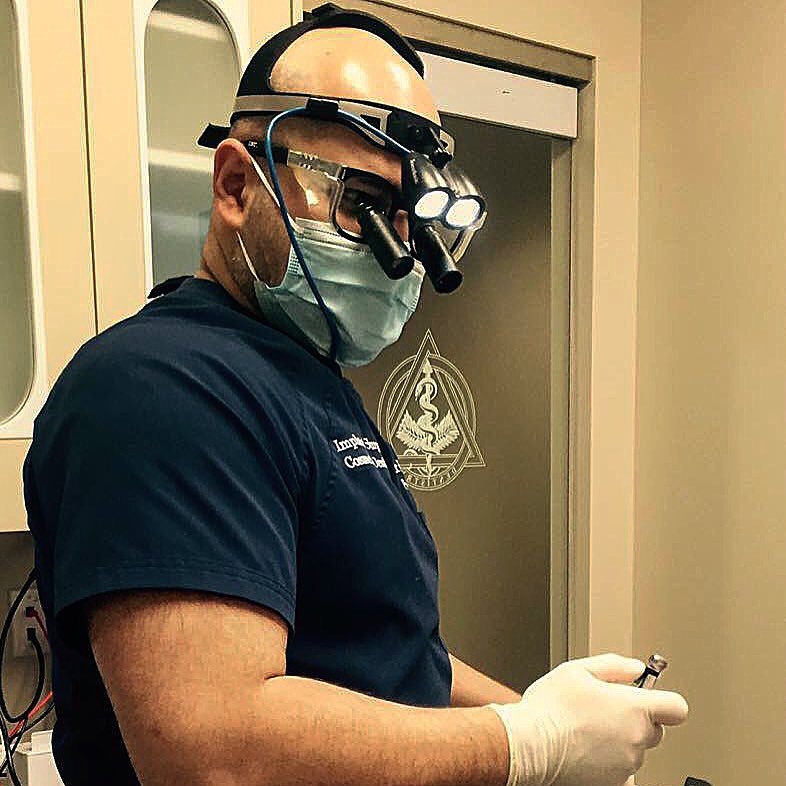
However, there are cases where the root is too deep. The dentist might suggest cutting the tooth into pieces in order to remove it.
This is not always done correctly as it requires a great amount of skill to successfully complete.
If done wrong, it can be an excruciating and long recovery for the patient.
A long recovery also increases the risk of having Dry socket. The blood clot that forms may keep dislodging and won't heal all the way.
It is important to know at least a little bit about the dentist or oral surgeon you decide to visit.
Doing research on your dentist can be helpful in determining the quality of the doctor you are visiting.
A better dentist will determine a better experience and can help you to have a faster recovery.
What to Expect During Recovery After Wisdom Teeth Removal?
During recovery after wisdom teeth removal, expect a 1-2 week healing period. Swelling, pain, and bleeding may occur in the first few days REF . Follow the instructions for a smooth recovery. Stick to a soft food diet and avoid strenuous activities.
The recovery time after wisdom teeth removal typically lasts around 3-4 days, although it may vary depending on factors such as age and the complexity of the extraction. During the first few days of recovery, it is common to experience swelling and discomfort. To ensure a smooth recovery process, it is crucial to follow the post-operative care instructions provided by your dentist. If you experience severe pain, prolonged swelling, or excessive bleeding, please call us ASAP.
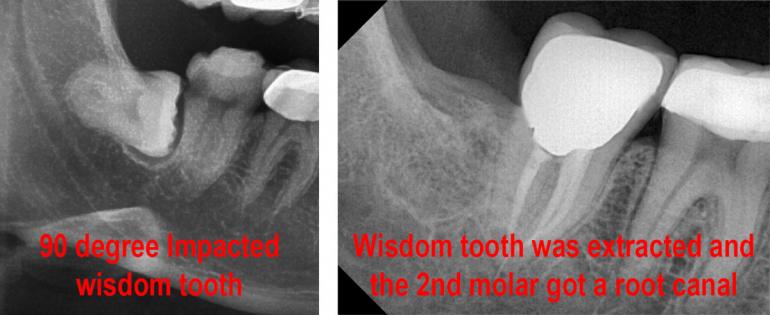
Tips for a Smooth Recovery
To ensure a smooth recovery after wisdom teeth extraction, it's important to follow these tips.
- Take your prescribed pain medication as directed by your dentist to manage discomfort.
- Avoid using straws or spitting vigorously, as this can dislodge blood clots that aid in healing.
- Stick to a soft cold food diet and gradually introduce solid and hot foods, following your dentist's advice.
- Rinse your mouth gently with salt water to keep the extraction site clean. and
- Lastly, make sure to follow the instructions for oral hygiene and attend all follow-up appointments.
How Long Is The Recovery Time After Wisdom Teeth Removal?
Recovery time is different for everyone.
The general recovery time for a simple extraction is 3-4 days.
If the wisdom tooth was impacted or coming in at a bad angle, then recovery time can be up to a week to fully recover.
It can take a couple of months for your extraction site to completely be healed.
It is important to take all of your antibiotics prescribed and maintain proper oral hygiene to prevent an infection.
Pain medication will be prescribed until needed. The wound will be less uncomfortable as your healing progresses.
You will be limited to eating soft foods for a while. The use of an ice pack may also be necessary if there is any swelling.
How To Prepare For Wisdom Tooth Removal
Wisdom teeth removal is considered an outpatient procedure. This means that in most cases you are able to get the procedure done in one sitting.
You will be able to leave the same day that you have it done.
It is important to ask your dentist any questions you have before the extraction.
Surgical Extractions will require IV Sedation or General anesthesia you will need someone to drive you home. You will also be limited to what you can eat before and after the surgery.
Generally, the doctor will give you a good idea of what to expect after the initial examinations are done.
Conclusion
In conclusion, wisdom teeth removal is a necessary procedure that can prevent future oral health problems and discomfort. The cost of wisdom teeth removal in Houston can vary depending on factors such as the type of extraction and whether you have dental insurance. However, there are affordable options available, including wisdom teeth removal packages and payment plans. It's important to carefully evaluate different dental clinics and seek multiple estimates to find the most cost-effective option for you. Additionally, the process of wisdom teeth removal may come with some post-surgery symptoms and potential complications, but following proper aftercare instructions can help ensure a smooth recovery. Don't let cost deter you from getting the dental care you need. Contact us today to schedule your wisdom teeth removal procedure and save money in the process.
1. Can the wisdom tooth cause damage to my other teeth WITHOUT me feeling it?
YES. Sometimes wisdom teeth can damage your teeth silently without giving any pain or discomfort till the tooth is damaged and beyond repair.
Here is a case for a patient that came to our office to have his impacted wisdom teeth removed, and the surgeon discovered the damage on the X-ray
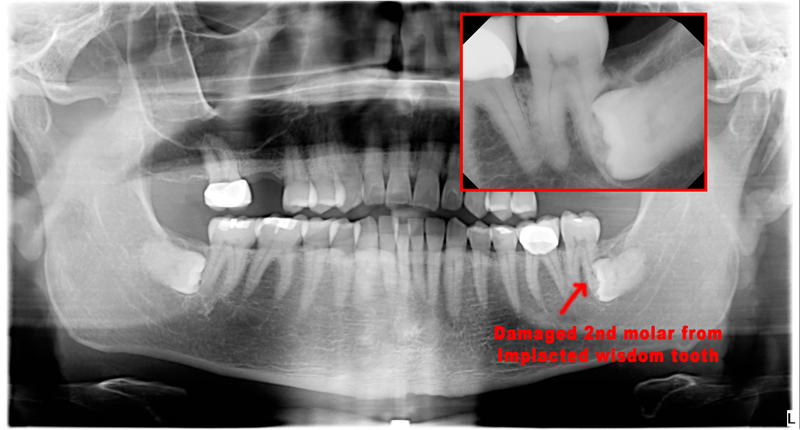
2. My dentist advised me to remove my wisdom teeth, but I want to wait.
Here is a case that we saw in 2018 and the patient decided to wait for her wisdom teeth removal. The patient came back 5 years later for pain on the lower right side and we can see how the old nice wisdom tooth caused damage to the adjacent tooth. Now the second molar needed a root canal and a crown for a total cost of $2200. This extra cost could be avoided if the patient had elected to remove the wisdom teeth back in 2018.
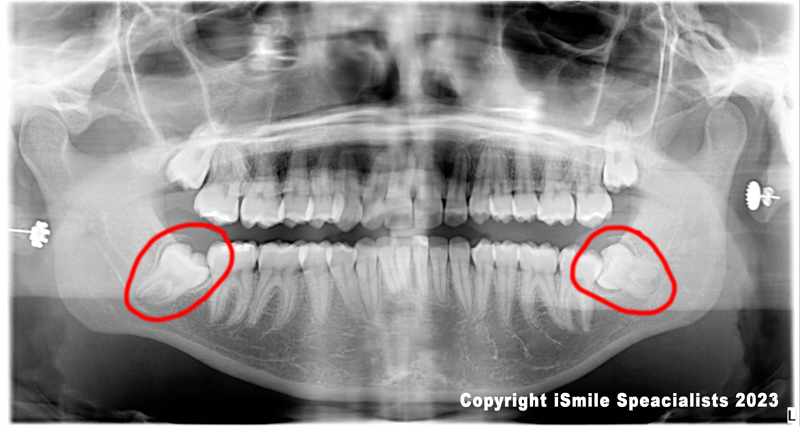
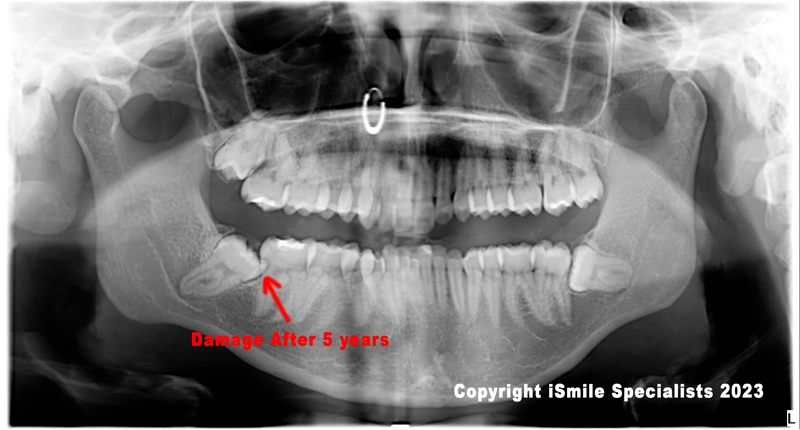
Please Do not let your wisdom teeth damage your good teeth.!
Do not let your wisdom teeth damage your good teeth.
Here is a patient that neglected the lower right wisdom tooth and the attack was fatal.
Call us for a FREE consult with X-rays to check on your wisdom teeth.

References
Friedman JW. The prophylactic extraction of third molars: a public health hazard. Am J Public Health. 2007 Sep;97(9):1554-9. doi: 10.2105/AJPH.2006.100271. Epub 2007 Jul 31. PMID: 17666691; PMCID: PMC1963310.
Sigron GR, Pourmand PP, Mache B, Stadlinger B, Locher MC. The most common complications after wisdom-tooth removal: part 1: a retrospective study of 1,199 cases in the mandible. Swiss Dent J. 2014;124(10):1042-6, 1052-6. English, German. PMID: 25342545.
Lodi G, Figini L, Sardella A, Carrassi A, Del Fabbro M, Furness S. Antibiotics to prevent complications following tooth extractions. Cochrane Database Syst Rev. 2012 Nov 14;11:CD003811. doi: 10.1002/14651858.CD003811.pub2. Update in: Cochrane Database Syst Rev. 2021 Feb 24;2:CD003811. PMID: 23152221.
Sanari AA, Alsolami BA, Abdel-Alim HM, Al-Ghamdi MY, Meisha DE. Effect of smoking on patient-reported postoperative complications following minor oral surgical procedures. Saudi Dent J. 2020 Nov;32(7):357-363. doi: 10.1016/j.sdentj.2019.10.004. Epub 2019 Oct 24. PMID: 33132664; PMCID: PMC7588501.
